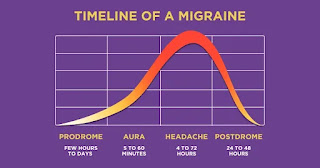The Four Phases of Migraines
The Four Phases of Migraines
Migraines are a neurological disease, of which the most common symptom is an intense and disabling episodic headache. Migraines are usually characterized by severe pain on one or both sides of the head and are often accompanied by hypersensitivity to light, hypersensitivity to sound and nausea.
The signs and symptoms of migraine vary among persons. Therefore, what a person experiences before, during and after an attack cannot be defined exactly. The four “signs and symptoms” below are common among persons but are not necessarily experienced by all migraine sufferers:
1.The prodrome, which occurs hours or days before the headache.
2.The aura, which immediately precedes the headache.
3.The headache phase.
4.The postdrome.
The first phase or prodrome
Prodromal symptoms occur in 40% to 60% of migraineures. This phase consists of altered mood, irritability, depression or euphoria, fatigue, yawning, excessive sleepiness, craving for certain food (e.g., chocolate), and other vegetative symptoms. These symptoms usually precede the headache phase of the migraine attack by several hours or days and experience teaches the person

.jpg)
.jpg)
Comments
Post a Comment